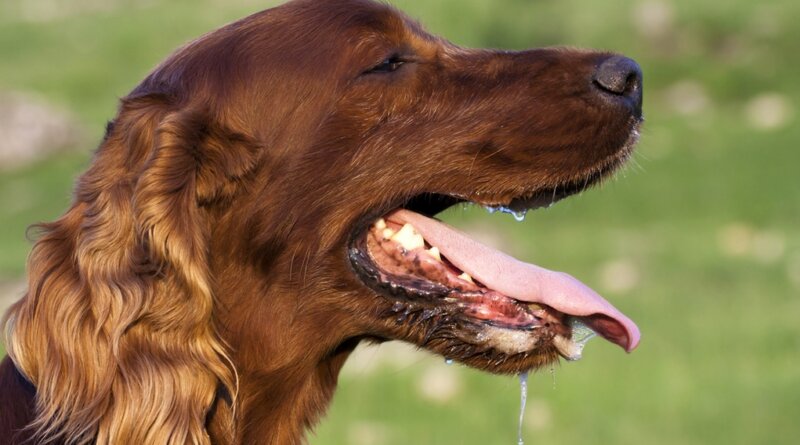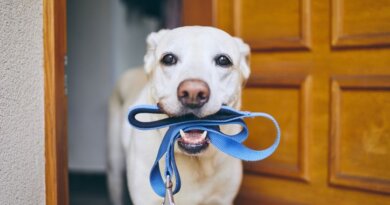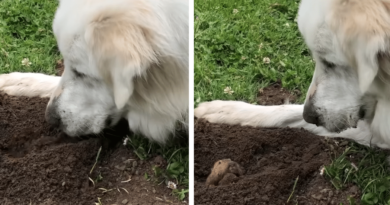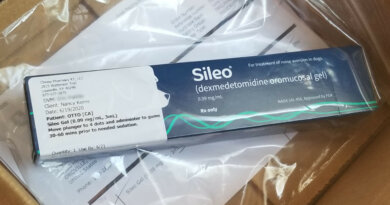What It Means & What You Should Do
Anyone who has been around a dog for any length of time knows that panting is normal dog behavior.
However, how much panting is too much?
Excessive panting in dogs can be caused by a variety of factors.
It is important to pinpoint the cause of your dog’s panting to make sure that he is safe.
Panting is a response amongst all dogs to heat, exercise, or excitement.
Contrary to popular belief, dogs do have sweat glands, but they are small, located on a dog’s feet pads, and ears, and do not efficiently cool off a dog.
Dogs use panting to further cool down, getting fresh air to their mouth, tongue, and lungs.
It is important that you watch and understand your dog’s normal panting patterns.
That way you can pinpoint exactly what is excessive panting for your dog. If your dog is heavily panting it’s important to call your veterinarian and make them aware.
Size, energy level, and temperament all influence how often your dog will pant.
Knowing your dog’s normal panting behavior will help you in knowing if he is having a problem.
Excessive Panting in Dogs
what it means & what you should do
Reasons your Dog is Panting A lot
Panting may be your first sign that something is wrong with your dog.
Depending on what is causing the panting, early intervention is key.
Often excessive panting is the first sign of overheating in dogs.
If your dog has been in excessive heat or without water, it is imperative to get him to shade and water to drink.
Other symptoms of heatstroke include glassy eyes, vomiting, diarrhea, and a body temperature over 104° F.
It is important to apply ice packs or a cold, wet towel to your pet’s chest, neck and head. You can submerge your dog in water, but be sure it is cool and not cold.
Also, giving your pet ice cubes to lick can help cool your dog down.
After you have initially started to cool your pet down, contact your vet right away because heatstroke requires medical assistance.
Another reason that your dog could be panting too much is emotional stress.
If your dog does not feel hot, then it is possible that he has undergone some emotional trauma, such as fireworks during the fourth of July.
Your pet may start yawning, lip licking, low wagging, tucking their tail, or showing other nervous behavior in addition to panting.
It is important that if your dog is having an emotional issue to separate them to a calm environment because a stressed dog can snap.
Having one-on-one time with you as the owner can help to bring your pet’s stress level down.
Panting can also be a sign of pain in a dog.
It is often the first sign that a dog will exhibit, so it is important to continue to keep an eye on your dog if you find your pet panting excessively without any other symptoms.
A dog will also bite at or lick the injured site, whine, or limp as the pain continues. However, if it is an internal injury your pet may not exhibit those symptoms.
If your dog seems injured, or is panting too much without any clear cause, it is important to call your vet.
A serious injury, especially an internal one, must be looked at by a veterinarian to avoid complications.
RELATED: The Ultimate Guide of First Aid for Dogs
Conditions That Can Cause Excessive Panting in Dogs

While some of these conditions aren’t serious, some of them could be fatal if not treated quickly.
It’s best to get your dog to a veterinarian as soon as you notice him panting excessively.
1. Cushing’s Disease
Excessive panting can also be a symptom of Cushing’s Disease in dogs.
Cushing’s Disease is an endocrine disorder in dogs where they produce too much cortisol.
Additional symptoms include eating and drinking too much, weight gain in the belly, hair thinning and lack of energy.
If your dog is exhibiting these symptoms, it is important to see a vet.
Although there is no one test to diagnose your pet, your veterinarian can rule out other disorders and start treatment.
Sometimes Cushing’s Disease can be caused by a tumor which can be removed.
Otherwise, it can be managed with medication.
It is possible for your dog to live a happy life with Cushing’s, and have a normal lifespan with proper treatment.
2. Medications

Steroids, such as prednisone, prednisolone or various forms of cortisone, can cause your pet to pant.
It should go away within a few weeks of stopping, but if you are concerned about your pet’s panting contact your veterinarian.
Excessive panting can be a sign of heart failure. Heart disease can affect pets just as much as humans, so it is important to know the warning signs in your dog, especially older dogs.
Some dogs are born with congenital heart problems that make them vulnerable, but age, diet, and exercise also can play a role in whether a dog can develop heart disease.
3. Heart and Lung Disease
Symptoms of heart disease include coughing, loss of appetite, fainting, weight changes, and having a hard time settling down in the evening.
Also note if your dog’s tongue or lips are blue or white, which means your dog is not getting enough oxygen.
If your dog is exhibiting these symptoms, it is important to call or visit your veterinarian as soon as possible, since early intervention is key to saving lives.
Depending on the cause of heart disease, your vet will have different courses of treatment. The vet may have to perform surgery to correct a heart murmur, torn valve or to place a pacemaker.
Your vet may also prescribe medication to help reduce fluid around the lungs or to correct an irregular heartbeat.
Your vet may also recommend a low-salt diet and gentle exercise that will not put too much strain on your dog’s heart.
Another serious cause of excessive panting in dogs is lung disease.
Lung disease, also known as Chronic Obstructive Pulmonary Disease (COPD) or chronic bronchitis, is a chronic, slow-progressing, irreversible condition.
The first symptom of COPD is often a dry, hacking cough that lasts more than a month.
As the disease progresses, the dog might pant excessively to increase oxygen.
There are certain ways to make a dog more vulnerable to COPD, such as chronic infections, exposure to tobacco smoke, air pollutants, or dental disease, but there is no final cause and some dogs develop it without these risk factors.
Although there is no cure for chronic bronchitis, your veterinarian will have recommendations to slow down its progression.
Obesity and dental disease can worsen symptoms, so you will want to address these issues if your dog suffers from either one.
If your dog is experiencing sudden, severe distress, hospitalization may be required to stabilize your pet’s condition.
Most dogs are treated on an outpatient basis, however, and can live a normal, healthy lifespan with proper treatment.
ALSO: Dog Coughing – 7 Reasons Dog Cough and What To Do
4. Anemia
Anemia can also be another cause of excessive panting in dogs.
In addition to panting, symptoms include gums that appear pale instead of bright pink and your dog may appear tired or listless.
This excessive lethargy will cause the panting that you observe. If your dog is exhibiting any of these symptoms, it is important to see your vet.
Because the causes of anemia can vary, so too will the treatments. Sometimes caused by trauma, your vet can check and stop any bleeding that is making your pet anemic.
There are also certain tumors and diseases that can make a dog anemic, so your vet may need to address or diagnose those.
Sometimes it is just caused by poor nutrition, so your vet may have some recommendations to correct it.
5. Laryngeal Paralysis

Laryngeal paralysis often referred to as Lar Par, is where the larynx cannot close completely, making it difficult for your dog to breathe or speak properly.
Lar Par typically effects bigger breeds and other symptoms include tiring quickly, change in your dog’s voice and hoarse sounds.
Lar Par can be very stressful for a dog to experience, but can be corrected by your vet.
Typically, your vet will seek first to calm the dog by placing your pet in an oxygen chamber. Lar Par can be corrected through surgery, where your vet will permanently open the larynx.
6. Pneumonia or Lung Tumors
Pneumonia can also cause your dog to pant too much. Pneumonia is inflammation of the lungs and is often caused by a bacterial infection.
Other symptoms of pneumonia include coughing, lack of appetite, lethargy, nasal discharge and fever.
If your dog seems to be having these symptoms, taking your pet to the vet for proper diagnosis and treatment is key.
Your vet can prescribe the correct medication and give nutritional advice (typically a high protein and calorie diet during recovery) so that your dog can heal quickly.
A very rare cause of excessive panting is a lung tumor. It accounts for only 1% of all cancer diagnosed in dogs, but excessive panting is one symptom.
Other symptoms include chronic cough, lack of appetite, chronic sneezing, limping, lethargy, and weight loss. If your pet is exhibiting these symptoms, it is important to see a veterinarian.
All lung tumors initially require surgery, so getting the vet as soon as possible is important.
The earlier your vet can remove the mass before it spreads, the better the outcome.
When Should I Worry About Dog Panting?
During the summer, depending on the temperature your dog is at risk of overheating and heatstroke which will cause heavy panting in your dog.
Excessive Panting in Dogs: Final Thoughts

Also, keep in mind that too much panting is often accompanied by other signs and symptoms, so pay attention to any other signs that your pet is exhibiting.
Any change in your dog’s breathing warrants medical attention, especially if it is sudden or severe. With many of the serious conditions that could be the cause, timing is key.
Do not ignore your dog’s heavy panting.
The faster your vet can check out and diagnose your pet, the more effective the treatment.
READ NEXT: Excessive Thirst In Dogs – Why Your Dog Drinks Too Much Water and What To Do
Related







zithromax canadian pharmacy https://zithromaxpharm.online/ buy zithromax 500mg online
baclofen euphoria